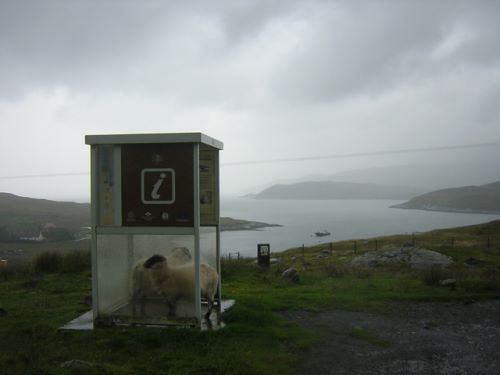Cathy Lane
is interested in sound and how it relates to the past, our histories, our enviroment and our collective and individual memories. This informs her current work as a composer, soundartist, lecturer and researcher. Aspects of her creative practice have develeoped out of these interests and concern composition with spoken word, field recordings and archive material and writing and lecturing on these and related subjects.
"On The Machair"
This piece is part of a larger work in progress that attempts to both explore and communicate something about history and memory related to the Outer Hebrides of Scotland, through sound. It uses a mixture of monologues, field recordings and interviews collected during a number of trips to the Outer Hebrides as well as material from existing oral history archives.
This section is loosely woven around aspects of the crofting lifestyle past and present. It starts on the machair (a Gaelic word that describes an extensive low-lying fertile plain which is one of the rarest habitat types in Europe. Almost half of all Scottish machair occurs in the Outer Hebrides) and in particular the machair around Sollas a small crofting township in North Uist. There are references to the importance of the machair to supporting crofting lifestyles in terms of the plants, crops, animals and birds that can be found there (including a recording made one night in 2004 of a corncrake with sheep and an accordian player at a party on the beach far in the background). It refers to the kelp industry which, along with the herring industry, supported a population of 93,000 in 1841 (present population is around 26,000, about half the size of the seaside town of Hove). It then moves on to sheep which largely replaced people on the machair after the clearances when thousands of families emigrated to Canada, New Zealand and Australia in the nineteenth century due to a mixture of force famine, crop failure and the demise of the kelp industry. Part of the recording here is of a mobile sheep sale which travels around the islands visiting small townships.
In 1849 33 constables were sent from Oban to Sollas to stand by as a population of 603 were forcibly evicted. A plaque on the Sollas machair commemorates this and celebrates how the existing 10 crofts except one have been occupied by the same families for the last century: "around us the Sollas landscape provides a heritage of ruined houses and fallen dykes, a poignant and permanent reminder of nineteenth century feudal oppression, clearance and emigration".
The voices are those of Donald MacSween of Ness, Harris, John and Mary Maclean from Berneray recorded by Cathy Lane and Lachlan MacQueen of North Uist who is talking about the clearances around Sollas in Gaelic. Lachlan was recorded by D.R. MacDonald in 1974 for the oral history archive at the School of Scottish Studies in Edinburgh.

